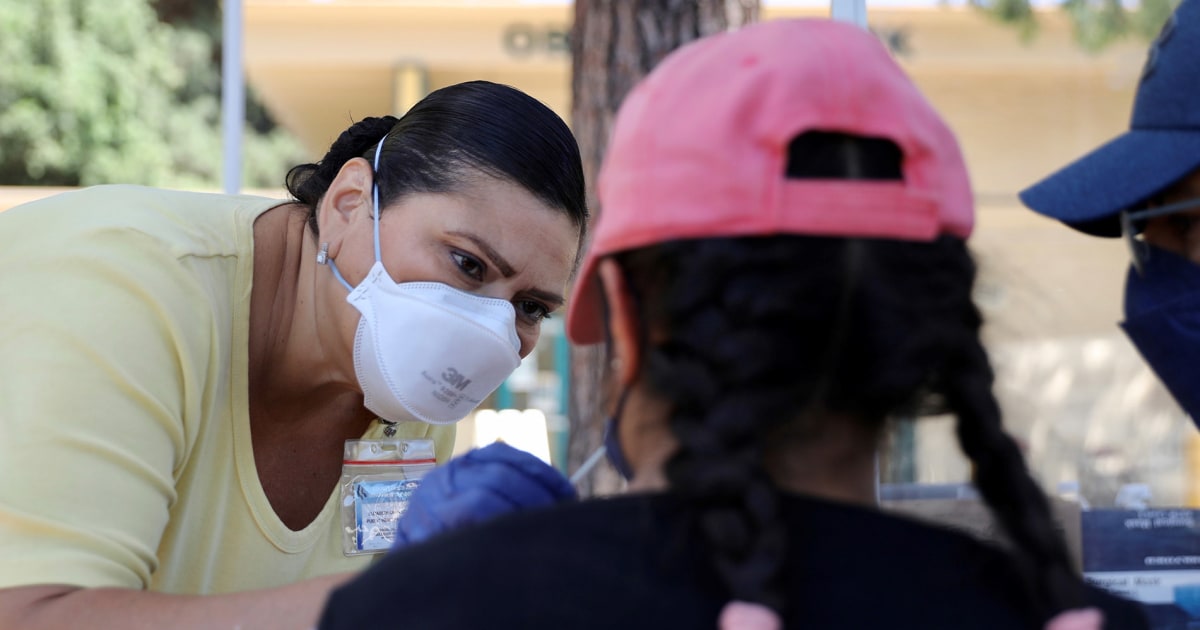By Aria Bendix. -NBC
News
COVID-19, influenza and respiratory syncytial virus (RSV) are causing a wave of respiratory infections across the country, and have already saturated about 76% of hospital beds, according to data from the Department of Health (HHS, in English).
Pediatric beds are at a similar level, but there are already six states with 90% occupancy, according to an analysis of HHS data from NBC News.
Coronavirus, influenza, and RSV infections can be difficult to distinguish from one another, as they share many symptoms.
But it's helpful to know which virus is causing the disease, as that determines the treatments you can receive and how long to isolate yourself.
COVID-19 test in Los Angeles.Xinhua News Agency via Getty Images
Some characteristics, whether they are symptoms or how the disease progresses, can help identify it:
There are unique symptoms in certain viruses
A runny nose, cough, congestion, or sore throat can be due to any of the three viruses or a common cold.
But loss of taste and smell is more commonly associated with COVID-19 than the flu or RSV.
Wheezing or difficulty breathing is often a telltale sign of a serious RSV infection, more common in children or older adults.
However, the only way to know for sure is to get tested.
“I don't think anybody says, 'Listen, I think you have this certain virus from your symptoms' and feels confident in determining what virus it is,” said Frank Esper, a pediatric infectious disease specialist at the Cleveland Clinic.
Do the symptoms come on gradually or all at once?
Flu symptoms tend to develop more suddenly than those of COVID-19 or RSV.
“Classically, the flu first appears with an abrupt fever that occurs quite quickly.
That's a bit in contrast to RSV and coronavirus, where we think of a slow escalation of symptoms," said Dr. Scott Roberts, an infectious disease specialist at Yale Medicine.
[Health alert due to record of children without measles vaccination]
When do the first symptoms appear?
Diseases have different incubation periods: the time between a person being in contact with the virus and symptoms.
On average, flu symptoms tend to appear two days after exposure to the virus, while RSV symptoms tend to take four to six days to appear, and the typical incubation period for COVID-19 is three to four days for the omicron variant.
Here are some signs that can help you tell if your child has RSV
Nov 4, 202201:47
"If I go to a party and have symptoms the next day, it's probably the flu because the incubation period can be as short as 24 hours," Roberts said.
Age determines symptoms and severity
RSV is unlikely to make a healthy adult very sick, while COVID-19 and the flu certainly can.
"In general, if you're young and healthy, or not very old and have fairly severe disease, it's probably not RSV," Roberts said.
The groups most vulnerable to serious infections by this virus are infants, children with lung diseases, those over 65 years of age, and people with weakened immune systems.
[
Where does the false belief that vitamin C cure or prevent the flu come from?
]
Symptoms can also look different depending on age and immune status.
Many children are exposed to respiratory viruses for the first time this year as in-person classes and usual socializing activities resume after pandemic restrictions, so their bodies may have a harder time clearing the infection, which can lead to broader symptoms.
The Secretary of Health begs the population to get vaccinated to "help" hospitals
Oct 26, 202200:54
According to Esper, almost a quarter of children have gastrointestinal symptoms (such as diarrhea, stomach pain or vomiting) from viral infections.
It is less common in adults with the flu or RSV.
People with weakened immune systems are more likely to develop severe symptoms or pneumonia from any of the three viruses.
Which virus is circulating the most in the community?
Disease experts anticipate that coronavirus cases will increase during the holidays, as it is a time when people travel more and gather indoors.
The average number of daily cases reported to the Centers for Disease Control and Prevention (CDC) has already risen nearly 11% in the past two weeks, according to NBC News' tally.








